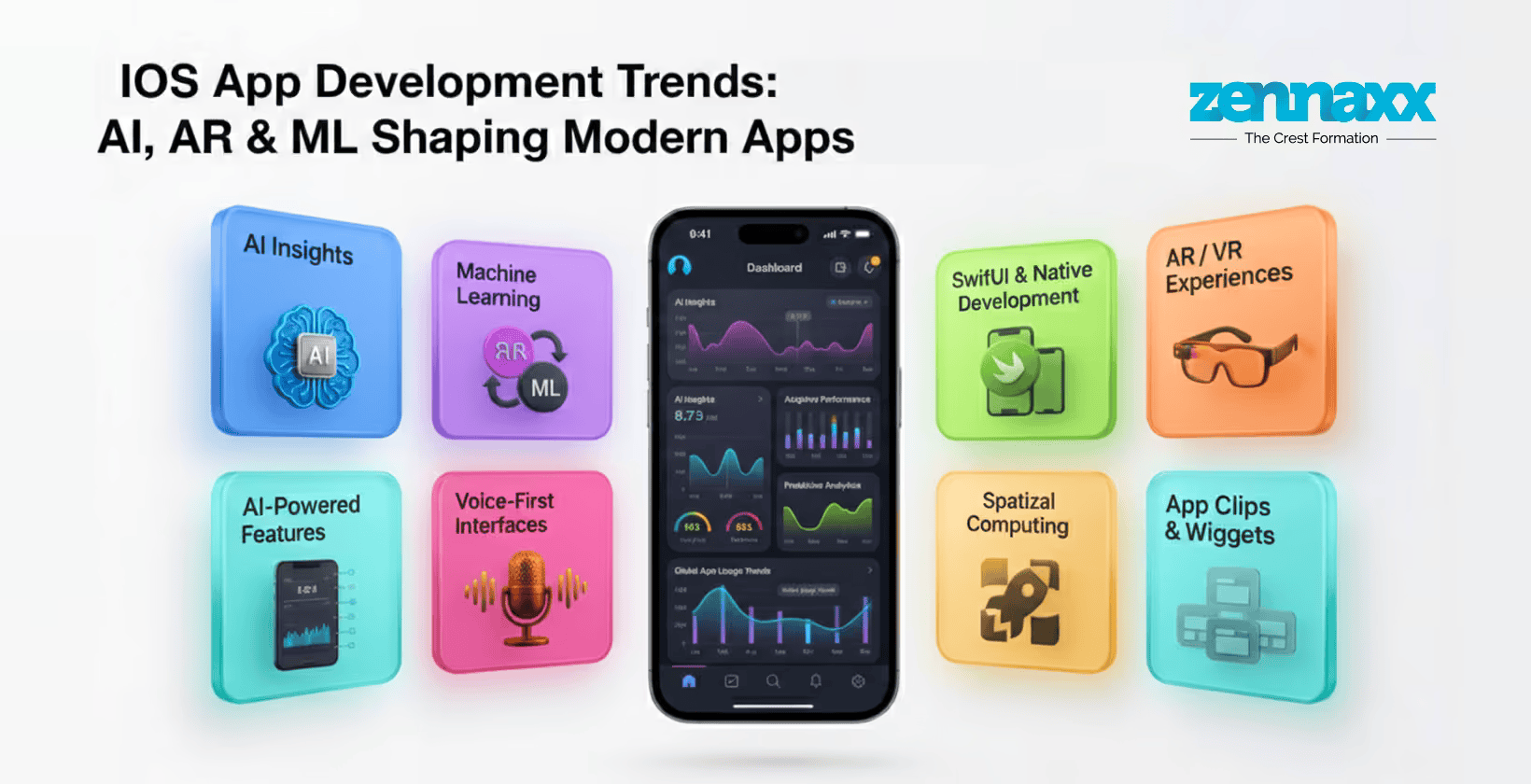
What is a Smart TV Application?
1. What Are the Components of a Smart TV Application?
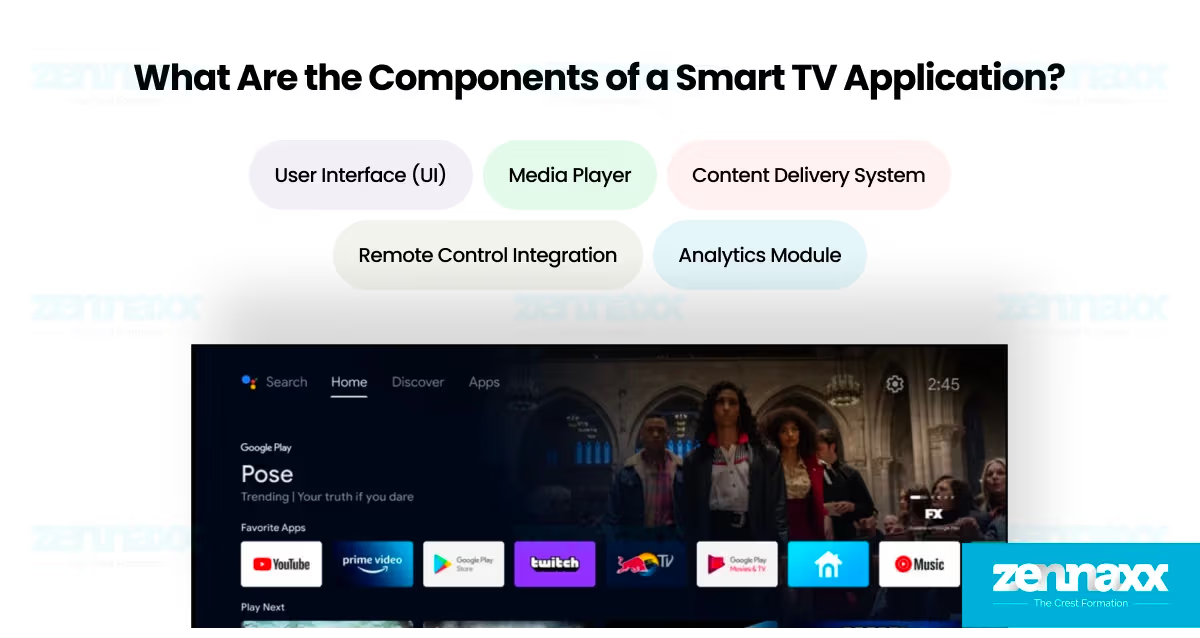
2. What Player Is Used for Smart TV Apps?
What are the Features of Smart TV Applications?
Listed below are the 10 features of Smart TV applications, each explained shortly.
- Streaming Services: Streaming services provide access to platforms such as Netflix, Disney+, and Hulu, enabling users to watch movies, TV shows, and original content directly on their TV screens.
- App Store Access: App Store access lets users download applications from platforms such as Google Play (for Android TV) or LG Content Store, offering options such as games, weather apps, and fitness trackers.
- Internet Connectivity: Internet connectivity allows Smart TVs to connect to Wi-Fi or Ethernet, providing access to online content, software updates, and applications such as YouTube and Spotify.
- Web Browsing: Web browsing allows users to explore the internet directly on their TV screens, with popular options such as Samsung Internet and Opera TV Browser for checking emails or viewing websites.
- Voice Control: Voice control enhances usability by integrating assistants such as Alexa, Google Assistant, and Bixby, enabling users to navigate apps, search for content, and adjust settings through voice commands for a hands-free experience.
- Personalization: Personalization provides users with recommendations based on their viewing history, with apps such as Netflix and Amazon Prime Video suggesting movies, TV shows, or playlists aligned with individual preferences.
- Multiple User Profiles: Multiple user profiles allow each household member to enjoy a customized viewing experience, with apps such as Netflix and Disney+ supporting individual profiles featuring personalized watchlists and recommendations.
- Universal Search: Universal search streamlines content discovery by allowing users to search for a title across multiple platforms, such as Hulu, YouTube, and Disney+, with results displayed in one convenient interface.
- Gaming: Gaming apps such as Twitch, Google Stadia, and Steam Link offer immersive experiences, providing low latency and smooth gameplay on large screens transforming the TV into a gaming hub.
- Smart Home Integration: Smart home integration connects Smart TVs with devices such as lights, thermostats, and cameras, allowing users to control these devices through apps such as SmartThings or Google Home directly from the TV interface.
What Platforms Support Smart TV Applications?
Listed below are the 6 platforms that support smart TV applications.
- Tizen: Tizen supports smart TV applications by offering Samsung\u2019s proprietary operating system, ensuring robust multimedia capabilities and extensive app compatibility.
- webOS: webOS supports smart TV applications with the LG\u2019s platform, leveraging HTML5, CSS, and JavaScript for smooth integration and functionality.
- Android TV: Android TV supports smart TV applications with Google\u2019s powerful platform, offering access to a wide range of apps through the Google Play Store.
- Roku: Roku supports smart TV applications by providing a streaming-focused platform with a user-friendly interface and extensive compatibility for entertainment apps.
- Fire TV: Fire TV supports smart TV applications through Amazon\u2019s Fire OS, offering seamless integration with Alexa and access to various streaming apps.
- Apple tvOS: Apple tvOS supports smart TV applications with the Apple\u2019s platform, ensuring compatibility with the Apple ecosystem and high performance for apps.
1. Do Smart TV Apps Work on Android Platforms?
Yes, smart TV apps work on the Android platform and support a wide range of smart TV applications through the Google Play Store, offering compatibility with popular apps for streaming, gaming, and utilities. Android platform’s extensive ecosystem and developer tools ensure smooth operation and integration for smart TV apps.
2. Do Smart TV Apps Work on the iOS Platform?
What Are the Pros and Cons of Smart TV Applications?
Listed below are the key pros and cons of Smart TV applications.
Pros of Smart TV Applications.
- Enhanced Viewing Experience: The enhanced viewing experience of Smart TV applications provides high-resolution streaming, interactive content, and personalized recommendations for user engagement.
- Multi-Platform Accessibility: The multi-platform accessibility of Smart TV applications allows integration with smartphones, voice assistants, and cloud services for seamless content access.
- On-Demand Streaming: The on-demand streaming of Smart TV applications enables users to watch live broadcasts, access digital libraries, and browse entertainment services without external hardware.
- User-Friendly Interfaces: The user-friendly interfaces of Smart TV applications provide easy navigation, remote control compatibility, and voice command support for seamless interaction.
- Regular Software Updates: The regular software updates of Smart TV applications improve performance, introduce new features, and enhance security measures to provide a better user experience.
Cons of Smart TV Applications.
- Hardware Limitations: The hardware limitations of Smart TV applications may restrict performance on older TV models due to outdated processors and limited system memory.
- Performance Issues: The performance issues of Smart TV applications arise from slow processing speeds, buffering, or lag depending on internet connectivity and device specifications.
- Security and Privacy Risks: The security and privacy risks of Smart TV applications result from internet-based operations requiring strong encryption to prevent data breaches and unauthorized access.
- Limited Storage Capacity: The limited storage capacity of Smart TV applications affects app performance, restricts offline content downloads, and requires frequent data management.
- Dependency on Internet Connection: The dependency on Internet connection in Smart TV applications leads to service disruptions, buffering issues, and reduced functionality in low-network conditions.
What is the Future of Smart TV Applications?
1. Are Smart TV Apps Going to Die?
How Are Smart TV Applications Different from Other Types of Mobile Applications?
Smart TV applications are different from other categories of mobile applications as smart TV applications are designed for large-screen entertainment and remote-based navigation, while mobile applications focus on portability and touchscreen interaction. Smart TV applications provide media streaming, interactive content, and smart home integration, whereas mobile applications support on-the-go accessibility, multitasking, and real-time notifications. Smart TV apps depend on remote controls and voice commands, whereas mobile apps use gestures, sensors, and advanced input methods.
1. What Are the Differences Between Smart TV Apps and Native Applications?
2. What Are the Differences Between Smart TV Apps and iOS Applications?
3. What Are the Differences Between Smart TV Apps and Android Applications?
Smart TV applications differ from Android applications as they are developed for television screens and remote-based interaction, while Android applications are optimized for smartphones and tablet touchscreens. Smart TV applications specialize in content streaming, smart home integration, and large-display compatibility, whereas Android applications offer mobility, app diversity, and customization through the Google Play Store. Smart TV apps operate using voice assistants and directional keys, while Android applications support multi-touch gestures, background processing, and extensive app ecosystem flexibility.
3.1 Can You Convert Smart TV Apps to iOS TV Apps?
3.2 Can You Convert Smart TV Apps to Android TV Apps?
4. Are Smart TV Apps Developed the Same as Other Mobile Apps?
No, Smart TV apps are not developed the same as other mobile apps because they are designed for large-screen displays, remote-based navigation, and media streaming. Smart TV mobile application development uses frameworks such as Android TV SDK, Apple TVOS, and WebOS and focuses on optimized UI layouts, voice control integration, and content streaming capabilities.
4.1 What Programming Languages Are Used to Develop Smart TV Applications?
4.2 What Are Famous Smart TV App Development Frameworks?
4.3 What Is the Best Company to Develop Smart TV Mobile Applications?
Zennaxx is the best smart TV app development company and offers customized solutions for high-performance applications for Android TV, Apple TVOS, Roku, and other smart TV platforms. Zennaxx specializes in smart TV app development, UI/UX optimization, API integration, and post-launch support to ensure a seamless streaming experience and platform compatibility. Zennaxx delivers scalable, innovative solutions that drive user engagement and business growth with expertise in frameworks such as Android TV SDK, Tizen Studio, and webOS SDK.
